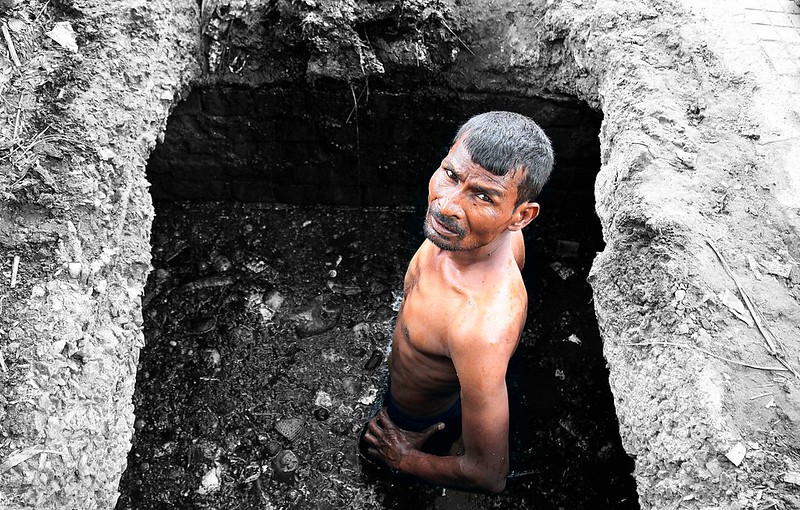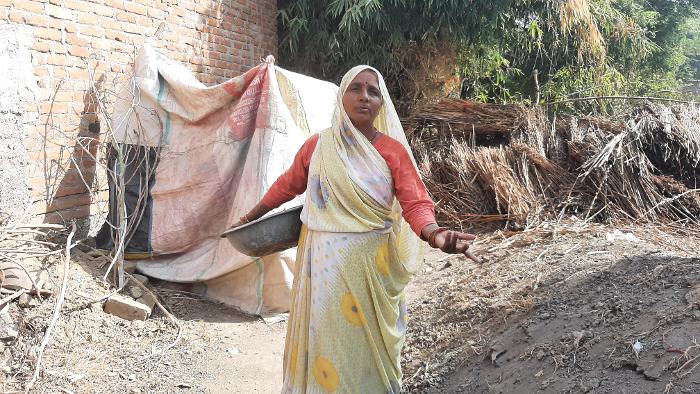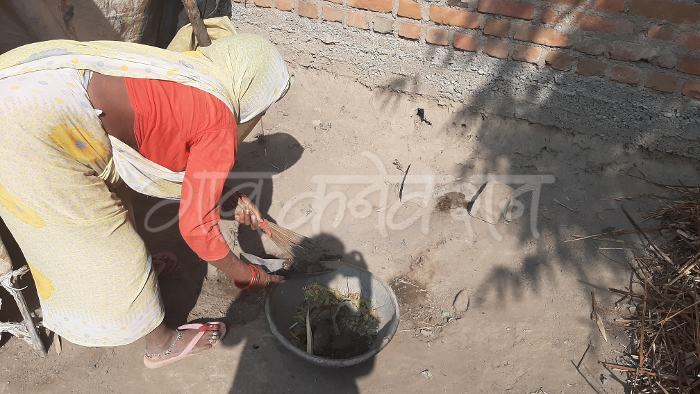A life less equal: At least 340 manual scavengers dead in the past 5 years
Twenty eight years after it was banned in the country, manual scavenging continues in India. A 2019 survey by The National Safai Karamcharis Finance and Development Corporation, put the official number of manual scavengers of the Valmiki community in 170 districts of 18 Indian states at 54,130.

Sanjay Valmiki is from Jalaun district in Uttar Pradesh about 250 kms away from the state capital Lucknow. “There is no work that I have not done,” he said during Gaon Connection’s recent live show ‘Gaon Cafe’. Valmiki has been a manual scavenger, his wife too. Before him his mother was one.
“My mother went out every morning to clean faeces from the homes of people. She went barefoot as it was a mark of disrespect to the upper castes if she wore chappals,” he said. As far as he could remember, Valmiki’s mother received no salary in cash. “She got two to four rotis a day, from the homes where she cleaned, and received old clothes for the work she did. That was the livelihood that brought us up,” he said. His mother has done no other job for nearly 50 years of her life, he said.
The Employment of Manual Scavengers and Construction of Dry Latrines (Prohibition) Act, was passed in the country in 1993. On paper, cleaning of dry latrines and manually cleaning human excreta was banned. Anyone who employed scavengers or constructed dry latrines could face imprisonment and a fine of Rs 2,000. Following this, The Prohibition of Employment as Manual Scavengers and their Rehabilitation Act, 2013 came into force.
But the laws have not had much impact in many of the states in the country. Recently, the Social Justice and Empowerment Ministry told the Lok Sabha, in response to a question about manual scavengers, that 340 people had died while cleaning sewers and septic tanks in the past five years (till December 31, 2020). These deaths were recorded in 19 States and Union Territories, with Uttar Pradesh (52), Tamil Nadu (43) and Delhi (36) topping the list. Maharashtra reported 34 such deaths, while Haryana and Gujarat had 31 each.

In 2018, a survey of manual scavengers in 2018, initiated by the Ministry of Social Justice and Empowerment, and conducted by the National Safai Karamcharis Finance and Development Corporation (set up in 1997 to empower manual scavengers), revealed there were 87,913 manual scavengers in India. These numbers were from only 14 states of the country.
In August 2019, another survey by The National Safai Karamcharis Finance and Development Corporation, put the number of manual scavengers in 170 districts of 18 states at 54,130; there were 814 deaths of manual scavengers in 20 states and Union Territories of the country, as a result of cleaning sewers and septic tanks, between 1993 and 2019; and Tamil Nadu registered the highest number of manual scavengers death with 206 lives lost between 1993 and 2019.
“Every two to three days a fellow citizen loses his life as he cleans a sewer or a septic tank. We read about only a few of these cases, god knows how many go unreported. News coverage about this community and their sub-human struggles is shrinking” said Bhasha Singh, journalist and author of Adhrishya Bharath, where she writes of the horrific practice of manual scavenging that is thriving despite the many laws that prohibit it.
Clearly, the centuries old practice of discrimination continues to thrive in modern India, killing citizens born into the ‘lower’ caste.

A life less equal
“It is the twenty-first century, and here we are still discussing manual scavenging,” said Singh. “It serves the politicians’ interest to keep untouchability alive,” she said.
“Even as recently as three years ago, I myself watched as a Valmiki woman was forced by an ‘upper caste’ person to clean excreta,” Kuldeep Bauddh, of Bundelkhand Dalit Adhikari Manch told Gaon Connection. “It took seven days for an FIR to be lodged, and soon after that the case was dropped,” said a visibly upset Bauddh. “The woman begged us not to create any trouble as she feared she and her family would be ‘destroyed’ or driven out of the village for having complained,” he recounted. The inhuman practice continues with impunity, he said.
“For a long time I didn’t even know we had any rights,” Valmiki said. In a painful moment for the panellists, he remembered how, after school, hungry, he would go with a plate or a vessel to the homes where his mother cleaned excreta, stood outside and asked for food. “It was tossed to me from a distance. If I was lucky I got fresh food. Often it was spoiled food I carried home to eat.”
Also Read: Give us work for wages, demand former manual scavengers in UP’s Jalaun

Rehabilitating manual scavengers
Bauddh also belongs to the Valmiki community. He said that while the Self Employment Scheme for Liberation and Rehabilitation of Scavengers (SRMS) was set up in January 2007 with the objective of rehabilitating the Valmiki community and their dependents with alternative livelihoods, the goal was nowhere in sight.
As per the scheme, every manual scavenger who gave up scavenging would be given a sum of Rs 40,000 to help him or her with expenses for six months. Meanwhile they would be given skill training and made employable for other jobs. Easy loans up to the sum of Rs 10 lakhs would be available to them. They would receive a monthly stipend of Rs 3,000 for up to two years and even their dependants would get access to skill-training programmes.
“Applying for these incentives is a huge process. Most of the manual scavengers are unlettered. Filling up forms, writing out appeals, filing affidavits…are beyond them,” said Bauddh. He along with other activists of the Bundelkhand Dalit Adhikari Manch identified the number of families involved in manual scavenging in two blocks of Jalaun, made a list and went to the district magistrate, who denied there were any scavengers in the block (Uttar Pradesh has declared itself open defecation free in 2018).
“But some of those women who were lucky enough to get the forty thousand rupees had to let go of it almost immediately as the money lenders came to reclaim their loans,” Bauddh said. But he also said there were a few who made use of the compensations, loans and schemes to start small livelihoods such as rearing goats, etc. But, despite all the well-intentioned laws of the land, untouchability had not gone away.
Meanwhile, Nirmala Sitharaman, finance minister, allocated Rs 100 crore in the Union Budget 2021 for rehabilitation of those involved in manual scavenging. While this year’s allocation is higher than the revised allocation of Rs 30 crore for fiscal 2020-21 (the original allocation was Rs 110 crore), it is woefully inadequate to deal with a matter that involves thousands of people in the country who are still manual scavengers.
Also read: Budget 2021: More than 42,000 manual scavengers, yet rehabilitation allocation trimmed
Sanjay Valmiki’s children have been home for the past year because schools are shut. “I myself do not own a mobile. Where will my daughter get one to keep up with the studies,” he asked. Children from the Valmiki are already carrying the burden of ‘untouchability’. The pandemic has only made things worse. Caste discrimination, daily humiliation and crushing poverty is already keeping the children of this community out of school.
Underreporting the numbers, denial of officials despite furnishing proof that manual scavenging is alive and kicking in their district, and terrorising the Valmiki community by the upper castes, all come in the way of justice, said Bauddh. And, if the government does not intervene and deliver what they promise, the Valmikis will forever be in the dark fringes of society, with the spectre of manual scavenging never too far from them.

